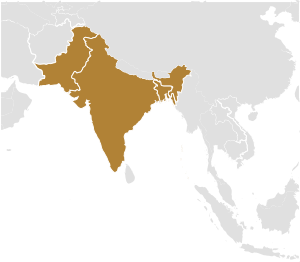
Back ديسي Arabic Desi BCL দেশী Bengali/Bangla Desi Czech Desi German Desi Spanish Desi French देसी Hindi Desi ID デシ (南アジア) Japanese

Desi[a] (/ˈdeɪsi/ or /ˈdɛsi/[2] DAY-see or DESS-ee; Hindustani: देसी (Devanagari), دیسی (Perso-Arabic), Hindustani: [deːsiː])[b] also Deshi, is a loose term used to describe the peoples, cultures, and products of the Indian subcontinent and their diaspora,[4] derived from Sanskrit देश (deśá), meaning 'land' or 'country'.[5] Desi traces its origin to the people from the South Asian republics of Bangladesh, India, and Pakistan,[c][1] and may also sometimes include people from Myanmar, Bhutan, Afghanistan, Maldives, Nepal, and Sri Lanka.[6][7][8][9][10]
- ^ a b Zimmer, Ben (27 September 2013). "Here She Comes, 'Desi' Miss America". The Wall Street Journal. Retrieved 12 October 2020.
But as South Asians have built up diasporic communities around the world, 'desi' has traveled with them, used not as a put-down but as an expression of ethnic pride. Make that pan-ethnic: Anyone with heritage from the subcontinent—India, Pakistan, or Bangladesh—can identify as a 'desi' and partake in 'desi' culture.
- ^ "Desi". Oxford English Dictionary (Online ed.). Oxford University Press. Retrieved 31 July 2024. (Subscription or participating institution membership required.)
- ^ Cite error: The named reference
Sharma2010was invoked but never defined (see the help page). - ^ Glenn, Charles L. (2018-08-01). Muslim Educators in American Communities. IAP. p. 222. ISBN 978-1-64113-363-0.
- ^ Steinberg, Shirley R.; Kehler, Michael; Cornish, Lindsay (17 June 2010). Boy Culture: An Encyclopedia. ABC-CLIO. pp. 86–88. ISBN 978-0-313-35080-1. Retrieved 12 March 2012.
- ^ Irani, Farzin (27 February 2022). Cultural Diversity in Neuropsychological Assessment. Routledge. ISBN 978-1-000-51578-7.
People from this region in South Asia (i.e., Afghanistan, Bhutan, Maldives, Nepal, Sri Lanka, India, Bangladesh, and Pakistan) are broadly referred to as "Desi," meaning from this land. This is a colloquial term used by other South Asians to refer to people of their region when outside of their native land.
- ^ "Who is APIDA?". California State University San Marcos. Archived from the original on 20 March 2023. Retrieved 25 January 2024.
In our references, Desi countries of origin include Afghanistan, Bhutan, Bangladesh, India, Maldives, Nepal, Pakistan, and Sri Lanka.
- ^ Conroy, Colette; Ong, Adelina; Rodricks, Dirk J. (2020-06-09). On Access in Applied Theatre and Drama Education. Routledge. p. 81. ISBN 978-1-000-70848-6.
Desi refers to the peoples indigenous to the precolonial Indian subcontinent, which is now comprised of several nation states that include India, Pakistan, Bangladesh, Bhutan, Nepal, Sri Lanka and Maldives.
- ^ Mallapragada, Madhavi (15 October 2013). Virtual Homelands: Indian Immigrants and Online Cultures in the United States. University of Illinois Press. pp. 117–118. ISBN 9780252096563.
- ^ "desi". OxfordDictionaries.com. Oxford University Press. 2016. Archived from the original on July 21, 2012. Retrieved 12 October 2016.
Cite error: There are <ref group=lower-alpha> tags or {{efn}} templates on this page, but the references will not show without a {{reflist|group=lower-alpha}} template or {{notelist}} template (see the help page).